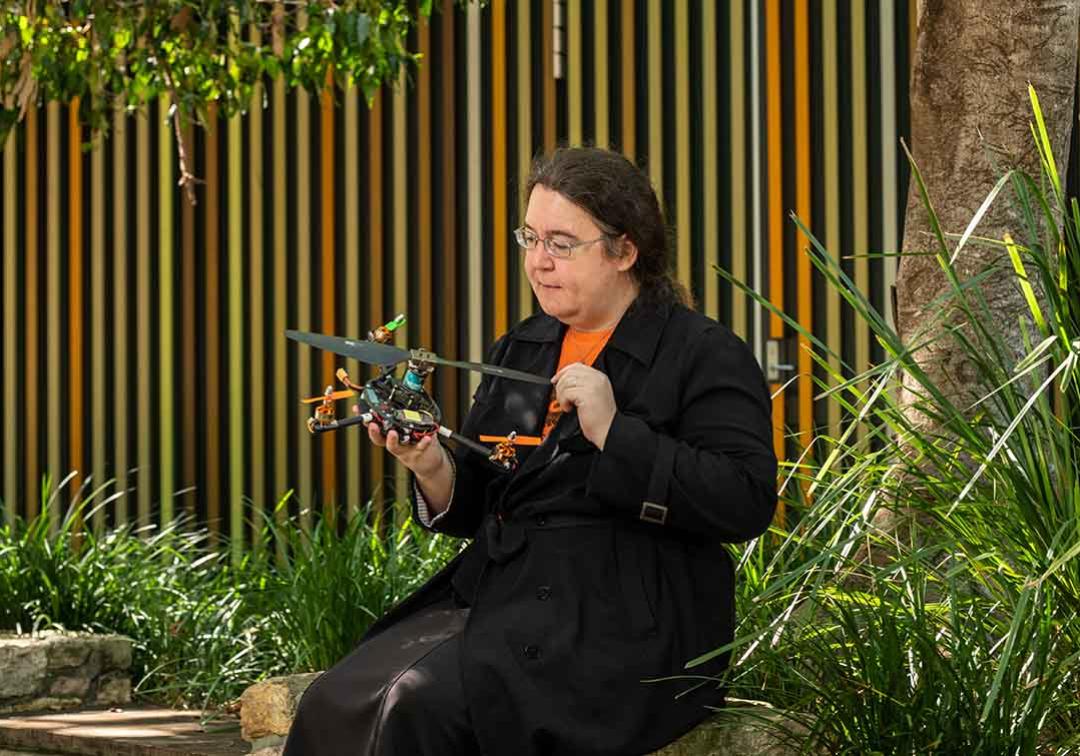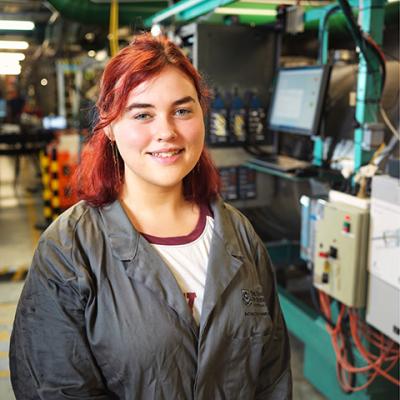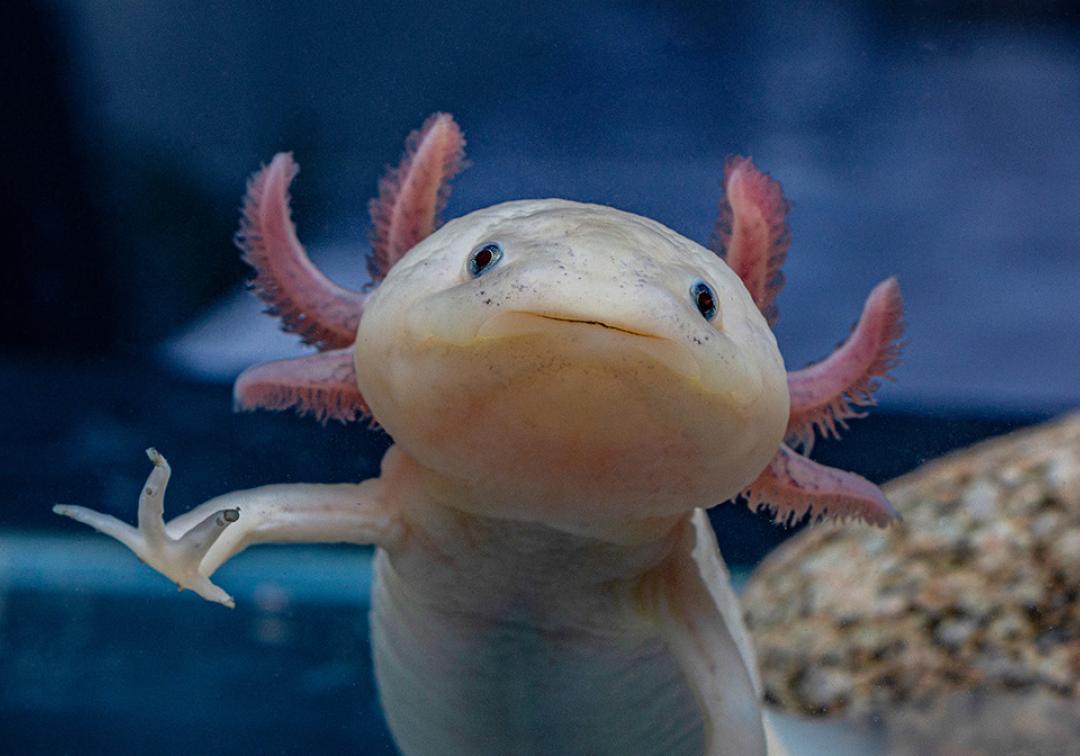
Bachelor of Engineering (Honours)
Overview
The future of engineering is changing. And so are we.
We’ve been busy reimagining the Bachelor of Engineering (Honours) and have crafted a new curriculum that will place you at the forefront of engineering in 2026, 2036 and beyond.
You’ll benefit from a new flexible first year with hands-on experiences across all aspects of engineering, more study options for greater career opportunities, and direct contact with industry – your future employers – threaded throughout your degree.
You’ll develop technical skills through a core specialisation, which will form the basis of your career. Choose from either chemical engineering, civil engineering, electrical engineering, mechanical engineering, mechatronic engineering or software engineering.
You’ll also have the option to complement your engineering specialisation with a major or minor in one of the new and emerging areas of engineering. Our broad range of majors allows you to further tailor your studies to match your career aspirations and deep dive into your interests.
Not sure what you want to study? No worries – our flexible first year allows you to try out introductory courses from our 6 core specialisations to see what you like best. Or, if you prefer, you can enrol directly in your chosen study area from day one.
You'll graduate with a respected honours qualification, with advanced knowledge and skills that will set you apart in a competitive job market, prove your leadership potential and provide a pathway to future research or learning.
No matter which path you choose, you'll be prepared for the jobs of the future.
Program highlights
- More study options for greater career opportunities. UQ is home to the largest number of engineering study options in Queensland, with 6 core specialisations, 12 majors and 3 minors to choose from.
- New flexible first year. Experience the diverse range of engineering disciplines before deciding on a specialisation – choose your program path in your first or second year.
- Benefit from a program designed in collaboration with your future employers and gain hands-on experience from day one, with industry contact and projects embedded throughout your studies.
- From the very beginning of your degree you’ll be in the labs and studios designing, building and doing engineering – with extensive practical experiences woven all the way through your studies.
Specialisations
Tailor your studies to suit your goals. This program offers these options:
- Chemical Engineering
- Civil Engineering
- Electrical Engineering
- Mechanical Engineering
- Mechatronic Engineering
- Software Engineering
How you'll learn
Your learning experiences are designed to best suit the learning outcomes of the courses you choose.
- Lectures
- Tutorials
- Work placements
- Overseas study
- Laboratory work
- Fieldwork
- Workshops
What you'll study
At UQ, degrees are called 'programs' and subjects are called 'courses'. Here's a sample of the courses you could study in this program:
- Professional Engineering
- Programming for Engineers
- Statics and Materials
- Engineering Thermodynamics
Dual programs
Double your skills and your opportunities with a dual degree. You can study the Bachelor of Engineering (Honours) as a part of these dual programs:
- Bachelors of Engineering (Honours) / Economics
- Bachelors of Engineering (Honours) / Biotechnology
- Bachelors of Engineering (Honours) / Mathematics
- Bachelor of Engineering (Honours) / Diploma in Languages
- Bachelors of Engineering (Honours) / Information Technology
- Bachelors of Engineering (Honours) / Business Management
- Bachelors of Engineering (Honours) / Design
- Bachelors of Engineering (Honours) / Science
- Bachelors of Engineering (Honours) / Arts
- Bachelors of Engineering (Honours) / Commerce
- Bachelors of Engineering (Honours) / Computer Science
Career possibilities
Our programs prepare you for your first job and beyond. Depending on which major you choose, here are some of the careers you could be on your way to:
- Chemical engineer
- Civil engineer
- Structural engineer
- Electrical engineer
- Biomedical engineer
- Mechanical engineer
- Aerospace engineer
- Mining engineer
- Software engineer
- Process engineer
Graduate salary
Engineering (undergraduate)
compared.edu.au
Professional memberships
When you graduate, you may be eligible for memberships with the following professional organisations. Contact the organisation to find out how to become a member.
- Australian Computer Society
- Australasian Institute of Mining and Metallurgy
- Engineers Australia
- Institution of Chemical Engineers
Program accreditation
The Bachelor of Engineering (Honours) is accredited by:
- Engineers Australia
Events
See all events
29 June
Queensland Biology Winter School, Year 12

1 July
International Baccalaureate Research Skills Program
Stories
See all stories
UQ people
Studying overseas: a UQ engineering student experience
3-minute read

UQ people
Meet the expert: exploring mechatronics with Dr Pauline Pounds
6-minute read

Uni life
What's it really like to study biomedical engineering?
5-minute read
Stories
See all stories
UQ people
Studying overseas: a UQ engineering student experience
3-minute read

UQ people
Meet the expert: exploring mechatronics with Dr Pauline Pounds
6-minute read

Uni life
What's it really like to study biomedical engineering?
5-minute read
Entry requirements
Prerequisites
Studying Specialist Mathematics (Units 3 & 4, C) and both Chemistry and Physics is recommended as students will have increased flexibility in their studies.
Prerequisites
Studying Specialist Mathematics (Units 3 & 4, C) and both Chemistry and Physics is recommended as students will have increased flexibility in their studies.
Entry score threshold
| ATAR / Rank | IB |
|---|---|
| 84 | 32 |
These are the lowest adjusted scores we made an offer to in Semester 1, 2025. Entry scores are based on the most recent Semester 1 intake and are updated in April each year. Meeting the entry score threshold doesn't guarantee admission.
Guarantee your place at UQ: If you meet our guaranteed minimum ATAR you could secure an offer for your preferred program.
English language requirements
IELTS overall 6.5; reading 6; writing 6; speaking 6; listening 6. For other English Language Proficiency Tests and Scores approved for UQ
TOEFL iBT (including Paper Edition) - Overall 87, listening 19, reading 19, writing 21 and speaking 19.
PTE Academic - Overall Score of 64 and 60 in all sub bands.
BE - A minimum overall grade of 4 plus a minimum grade of C in all macro skills.
CES - Overall 176 and 169 in all sub bands.
OET is not accepted.
There are other ways to meet the English language requirements. For some programs, additional conditions apply.
Inherent requirements
To complete this degree, you have to meet its inherent requirements by demonstrating essential skills and attributes. Read the inherent requirements before you apply.
Student visas
International students who are accepted into full-time study in the Bachelor of Engineering (Honours) are eligible to apply for an Australian student visa (subclass 500).
There are a number of requirements you must satisfy before a visa is granted, including the Genuine Student (GS) requirement.
Entry score range
This table shows the range of entry scores for recent secondary students offered a place in the B Engineering (Hons) for Semester 1, 2025
| Without adjustments | With adjustments | |
|---|---|---|
| Highest | 99.95 | 99.95 |
| Median | 92.6 | 93.9 |
| Lowest | 79 | 84 |
Who you'll study with
Here's a snapshot of our student intake for this program in Semester 1, 2025:
| Applicant background | Number of students | Percentage of all students |
|---|---|---|
(A) Higher education study | 57 | 7.7% |
(B) Vocational Education and Training (VET) study | 12 | 1.6% |
(C) Work and life experience | N/P | N/P |
| (D) Recent secondary education | ||
| 485 | 65.8% |
| <5 | <5 |
| 0 | 0% |
International students | 175 | 23.7% |
Total | 737 | 100% |
"<5" — The number of students is less than 5.
N/A — Students not accepted in this category.
N/P — Not published. The number is hidden to protect the privacy of students in other cells.
Need help meeting the entry requirements?
Specialisations
Specialisations
Tailor your studies to suit your goals. This program offers these options:
Specialisations
Tailor your studies to suit your goals. This program offers these options:
Fees and Scholarships
Indicative annual fee
Approximate yearly cost of tuition (16 units). Your fees will vary according to your selected courses and study load. Fees are reviewed each year and may increase.
$8,255
2026
Approximate yearly cost of tuition (16 units). Your fees will vary according to your study load. Fees are reviewed each year and may increase.
AUD $58,056
2026
Additional costs
- Safety boots (AS2210) (up to $140)
- Hard hat (AS1801) ($15)
- Safety induction program ($40 with group, or $80 individual)
- Students who undertake vacation work, fieldwork or work experience will be required to fund their own travel and living expenses.
Government assistance
Financial aid
As an international student, you might be eligible for financial aid – either from your home country, or from the Australian Government.
HECS-HELP
Domestic places in the Bachelor of Engineering (Honours) are Commonwealth supported, as long as you meet all Commonwealth supported place eligibility requirements.
This means the cost of your education is shared between you and the Australian Government. Instead of tuition fees, Commonwealth supported students pay what are called student contribution amounts.
If you have a Commonwealth supported place, you may also be eligible for HECS-HELP. This is an Australian Government loan scheme to assist eligible students with the cost of their student contribution amounts.
Centrelink support
The Australian Government offers a number of income-support payments to eligible Australian university students.
Scholarships
You may be eligible for more than 100 scholarships, including:
How to apply
Applying online
If your senior schooling is from outside Australia, you can submit your application to UQ. Or, if you prefer, you can use an approved UQ agent near you.
The program code for the Bachelor of Engineering (Honours) is 2455.
How to apply for undergraduate study
If your senior schooling is from Australia
Submit your application to the Queensland Tertiary Admissions Centre if you're an international student who is currently studying:
- Australian Year 12 (in Australia or another country), or
- the International Baccalaureate in Australia.
The QTAC code for the Bachelor of Engineering (Honours) is 717001.
Applying through QTAC
All domestic applications should be submitted to the Queensland Tertiary Admissions Centre (QTAC).
The QTAC code for the Bachelor of Engineering (Honours) is 717001.
Important dates
If you’re studying Year 12 in Australia, go to the QTAC website to check the closing date for this program.
If you’re applying to UQ, the closing date for this program is:
- To commence study in semester 2 - May 31 of the year of commencement.
- To commence study in semester 1 - November 30 of the previous year.
Visa processing times vary. Apply and accept your offer as early as you can.
To learn more about UQ dates, including semester start dates, view the Academic Calendar.
Important dates
To check the closing date for this program, go to the QTAC website.
To learn more about UQ dates, including semester start dates, view the Academic Calendar.
Admissions schemes
Applying to university can be both exciting and daunting, which is why we’ve tried to make the process as simple as we can.
We have several schemes in place to improve your chances of getting a place at UQ.
Pathway options
A rank or score doesn’t determine your potential.
If you're not offered a place in your first-choice program – or if you don't meet the entry requirements – you still have a number of options.
Aboriginal and Torres Strait Islander applicants
For support with applying – or if you have any questions about university life – get in touch with our Aboriginal and Torres Strait Islander Studies (ATSIS) Unit.
Explore other programs
Express yourself. And your interest.
They say choosing a degree is hard, which is why we've made it easy. Register your interest and we'll send you everything you need to know about applying to UQ.






